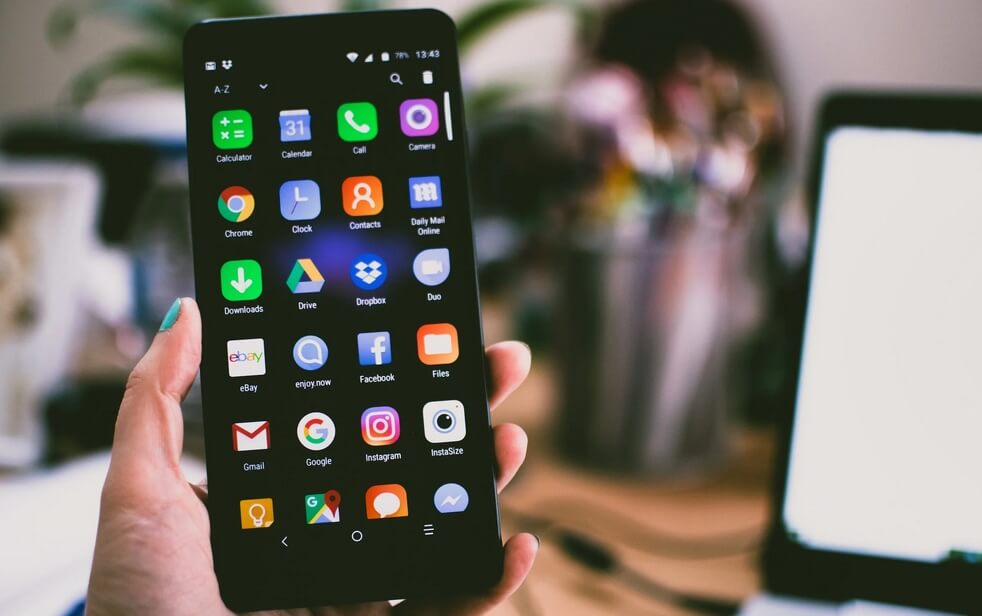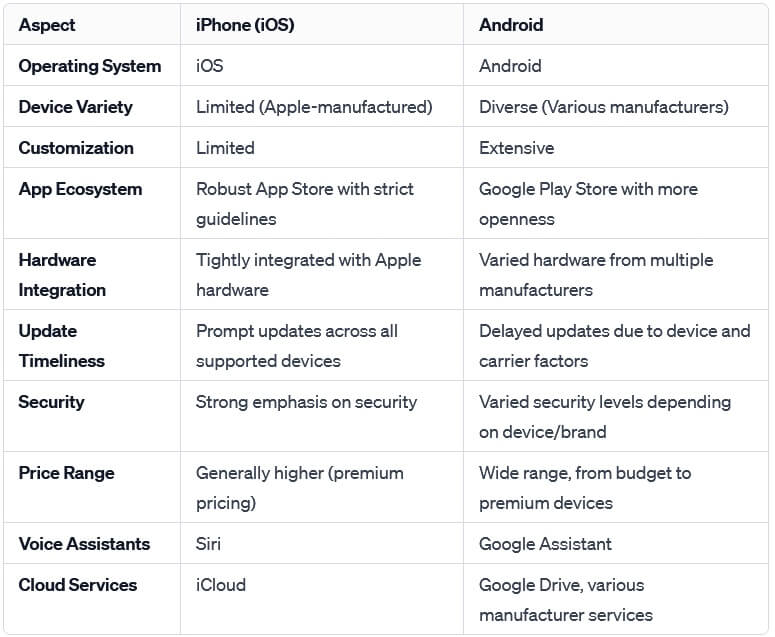The choice between an iPhone and an Android phone ultimately depends on your preferences, needs, and priorities. Both iPhone and Android devices have their strengths and weaknesses.

Here are some factors to consider:
1. Operating System:
- iPhones run on iOS, which is known for its smooth user experience, security, and regular updates. If you value a straightforward and consistent interface, iOS might be a good choice.
- Android is an open-source operating system used by a variety of manufacturers. It offers more customization options, diverse hardware choices, and flexibility in terms of software. If you prefer a more customizable experience, Android might be more suitable.
2. Hardware Diversity:
- iPhones are manufactured exclusively by Apple, resulting in a more controlled and standardized hardware experience. If you prefer a tightly integrated ecosystem, iPhone might be the way to go.
- Android is used by numerous manufacturers, providing a wide range of devices with different specifications and designs. Android might be a better fit if you value having more options in terms of features, styles, and price points.
3. App Ecosystem:
- Both iOS and Android have robust app stores with millions of apps. However, some apps may be released on one platform before the other. If certain apps or features are critical to you, it’s worth checking their availability on both platforms.
4. Customization:
- Android is known for its high level of customization. Users can change the appearance of their home screens, install custom ROMs, and personalize many aspects of the user interface. If customization is important to you, Android might be more appealing.
- iPhones offer a more locked-down experience with limited customization options. If you prefer a simpler and more consistent interface, iOS might be a better choice.
5. Price Range:
- iPhones are typically premium devices with a higher price tag. Apple offers older models and budget-friendly options, but iPhones generally tend to be more expensive.
- Android devices come in a wide range of prices, from budget-friendly to premium. Android might be a better fit if you are price-sensitive and want more affordable options.

Technical specification comparison

Additional points to consider
There are several other factors to consider when choosing between an iPhone and an Android device. Here are some additional aspects that may influence your decision:
- Integration with Other Devices:
- iPhones work seamlessly with other Apple devices, such as Macs, iPads, Apple Watch, and Apple TV. If you already use or plan to use multiple Apple products, this integration can be beneficial.
- Android devices can work well with other Google services and devices, such as Chromebooks, Google Home, and Wear OS smartwatches.
- User Interface Design:
- iOS is known for its consistent and user-friendly interface, which can be appealing to users who prefer a straightforward experience.
- Android provides more flexibility in terms of interface design, allowing for greater customization and personalization.
- Gaming and App Performance:
- iPhones are often praised for their gaming performance and optimized apps, especially considering the uniformity of hardware across iPhone models.
- Android devices come in various configurations, and while high-end models offer excellent performance, there can be variations in app optimization.
- File Management:
- Android provides more flexibility in terms of file management, allowing users to access the file system and transfer files more easily.
- iOS has a more closed file system, and file management is generally done through specific apps or services.
- Battery Life:
- Battery life can vary among different iPhone and Android models. Consider the battery capacity and efficiency of the device based on your usage patterns.
- Camera Quality:
- Both iPhones and Android devices offer high-quality cameras, but the specific features and performance can vary. Consider your priorities regarding photography and video recording.
- Repairability and Maintenance:
- iPhones are known for their closed design, which can make repairs more challenging. Consider the availability of repair services and the ease of repairing or upgrading components.
- Some Android devices allow for more user-friendly repairs and upgrades, with replaceable batteries and expandable storage in some models.
- Availability of Accessories:
- iPhones often have a wide range of accessories available due to the popularity and standardization of Apple’s devices.
- Android devices have a diverse ecosystem of accessories, but availability may vary based on the specific manufacturer and model.
Ultimately, the best choice depends on your personal preferences, priorities, and how you plan to use your device. Consider the factors that matter most to you regarding user experience, ecosystem, features, and overall compatibility with your needs.